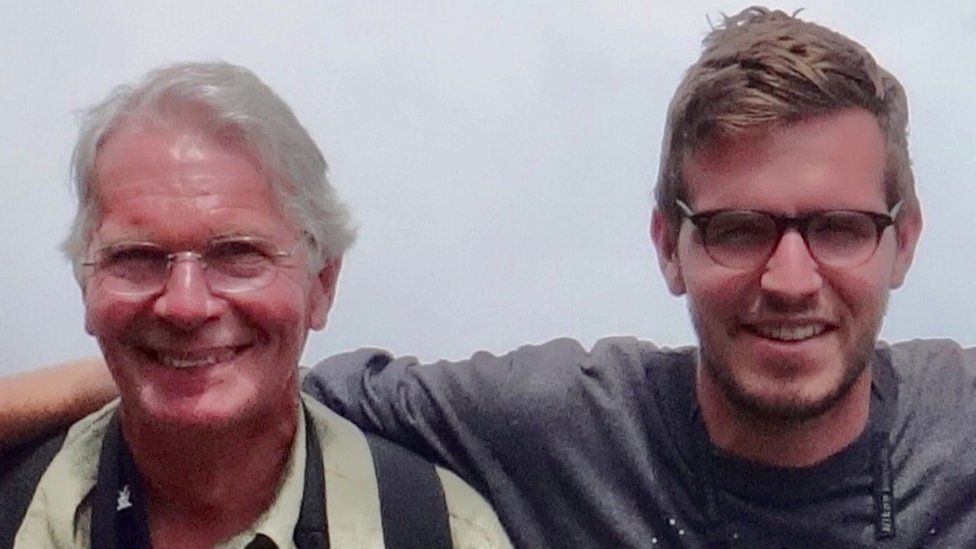A father whose son took his own life in July 2020 is calling for an “urgent overhaul” of the way some counsellors and therapists assess suicide risk.
His son Tom had died a day after being judged “low risk”, in a final counselling session, Philip Pirie said.
A group of charities has written to the health secretary, saying the use of a checklist-type questionnaire to predict suicide risk is “fundamentally flawed”.
According to the latest official data, 6,211 people in the UK killed themselves in 2020.
It is the most common cause of death in 20-34-year-olds.
And of the 17 people each day, on average, who kill themselves, five are in touch with mental health services and four of those five are assessed as “low” or “no risk”, campaigners say.
‘Absolutely wrong’
Tom Pirie, a young teacher from Fulham, west London, had been receiving help for mental-health issues.
He had repeatedly told counsellors about his suicidal thoughts – but the day before he had killed himself, a psychotherapist had judged him low risk, his father said.
“It’s difficult to admit suicidal thoughts, especially for young men,” Philip told BBC One’s Breakfast programme.
“And the danger, if the client is labelled at low risk, is they get the impression that this is not a topic to go into any further.
“And that is absolutely wrong.”
‘Suicidal intentions’
Tom’s assessment had been based on “inadequate” questionnaires widely used despite guidelines saying they should not be to predict suicidal behaviour, Philip said.
The checklists, which differ depending on the clinicians and NHS trusts involved, typically ask patients questions about their mental health, such as “Do you have suicidal thoughts?” or “Do you have suicidal intentions?”
At the end of the session, a score can be generated – placing the individual at low, medium or high risk of suicide, or rating the danger on a scale between one and 10
In July 2020, a Royal College of Psychiatrists report concluded the approach to suicide risk assessment was “fundamentally flawed” and the use of terms such as “low risk… unreliable, open to misinterpretation and potentially unsafe”.
Using scales or ratings could provide false reassurance, it said, especially when suicidal thoughts could vary significantly across a short time period.
And now, a group, including mental-health charities Mind, the Samaritans and Papyrus, has written to the health secretary saying: “Risk should not be defined as a number nor treatment determined by a ‘score’.”
Psychological crisis
One of the co-signatories of the letter, Zero Suicide Alliance co-founder Steve Mallen said: “It’s not that we’re saying these tools don’t have benefits – the problem is the way in which they are applied.
“Some clinicians seem to regard them as the be-all and end-all definitive judgement.
“It doesn’t take a genius to work out that when somebody is in a deep psychological crisis, what is really required is an in-depth conversation and a detailed appreciation of their circumstances and background.”
Mr Mallen, whose son Edward killed himself in 2015, added one of the main issues was a lack of resources in the system, with some NHS therapists and counsellors rushed into a “processed-based” approach.
Safety plan
Another co-signatory, Liberal Democrat MP for Richmond Park Sarah Olney, said: “We need these individualised assessments to go much deeper into what’s going on with people.
“And yet what we are seeing time and time again is, ‘We’ve ticked the boxes, we’ve filled out the form, where’s the next person?'”
Last week, the Department of Health and Social Care asked for evidence as part of plans to update its 2012 suicide-prevention strategy for England.
A department official said: “Every suicide is a tragedy, which is why we are investing £57m in suicide prevention through the NHS Long Term Plan.
“NICE [National Institute for Health and Care Excellence] guidelines advise staff not to use risk-assessment tools to predict suicide, though they can be helpful in developing a safety plan.”




